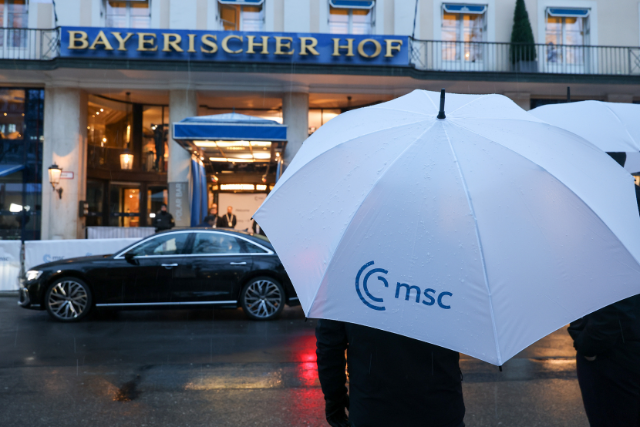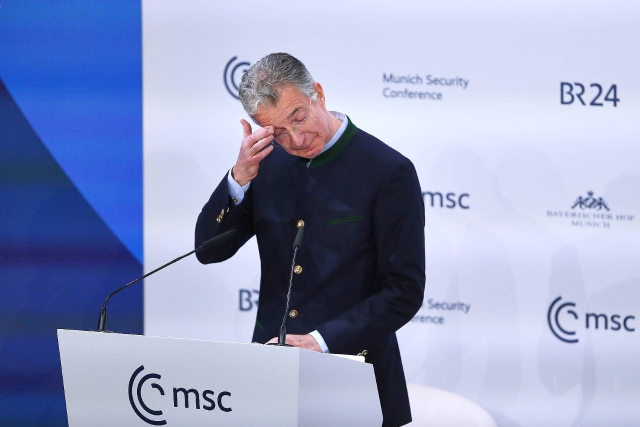
The venue for the Munich Security Conference in Munich, Germany, on Feb 14, 2025. (CFP Photo)
Outside of Hotel Bayerischer Hof, the venue for the Munich Security Conference (MSC), sleet over streets heralds that "winter is coming." Set in the Game of Thrones series, the motto reminds people of the need for vigilance, as political stability can be fleeting and threats can loom large unexpectedly.
The annual MSC, known as the "Davos for Defence," has been a barometer for geopolitics and novel threats and challenges since 1963. The 2025 MSC, themed with Multipolarization, coincides with "a pivotal moment of change," given US president Donald Trump 2.0, as well as an imminent new round of European legislature in Brussels.
US Vice President JD Vance's speech at the MSC echoed, more or less, Trump's foreign policies, which have brought European countries uncertainty and angst. Vance voiced the imperative for Europe to "step up in a big way to provide for its own defence" and laid bare that the threat he worries about the most regarding Europe is its internal side.
Polls seem to underpin the observation. According to a graph from the Munich Security Report this year on whether their country will be more secure and wealthy in the next decade, respondents from Italy, France, Germany, and the United Kingdom showed a negative attitude, with each country below 25% in Agreement but at least 40% in Disagreement.

Christoph Heusgen, Chairman of MSC fights back tears at MSC in Munich, Germany, on Feb. 16, 2025. (CFP Photo)
The gloomy mood throughout the European continent may be largely attributed to the Russia-Ukraine conflict, which has been dragging on for almost three years. People tend to recall The World of Yesterday: Memoirs of a European written by Austrian writer Stefan Zweig.
"When I attempt to find a simple formula for the period in which I grew up, before the First World War, I hope that I convey its fullness by calling it the Golden Age of Security," he lamented.
Correspondingly, across the Atlantic Ocean, Joseph Nye, a Professor Emeritus at Harvard University, who has lived through an American century in his eyes of the 20th century, can't help but inquire, "Does globalization have a future?" in his Op-Ed.
He stated that "globalization" typically conjures images of long-distance trade and migration; the concept also encompasses health, the climate, and other forms of international interdependence. However, he confessed that an anti-globalist America may end up limiting the beneficial forms while amplifying the harmful ones.
For all the despair at the MSC, we have seen rising powers and Global South countries take to the podium, contributing their efforts to secure a safe world and prevent anarchy across the globe.
The 2025 MSC report has added Brazil, Russia, India, China, and South Africa——the five BRICS countries, providing each country with one chapter to detail. The BRICS countries have amounted to over 35% of the world's GDP in terms of purchasing power parity (PPP) in 2024.

Chinese FM Wang Yi speaks at the Munich Security Conference in Munich, Germany on Feb 14, 2025. (CFP Photo)
Among them, China has been a critical engine for global economic growth, accounting for some 30% of the world's economic growth.
At the MSC, China has voiced that the country is willing to synergize high-quality Belt and Road cooperation with the European Union's Global Gateway strategy to empower both sides and the entire world.
Additionally, China has called for all stakeholders in the Russia-Ukraine conflict to participate in the peace talks, underlining the most widespread consensus.
Amid an era of multi-polarization, which entails that cleavages between major powers may spring up and competition among various solutions hinders joint approaches to global crises and threats, safeguarding and obeying a shared international order is the top priority.
In this vein, countries can concert their efforts to address traditional and non-traditional security threats in a more rapidly iterative world. The Munich winter in February would echo British poet Percy Shelley's stanza, "If Winter comes, can Spring be far behind?".
Author | Zhang Ruijun
Editor | Yuan Zixiang, James, Shen He
















